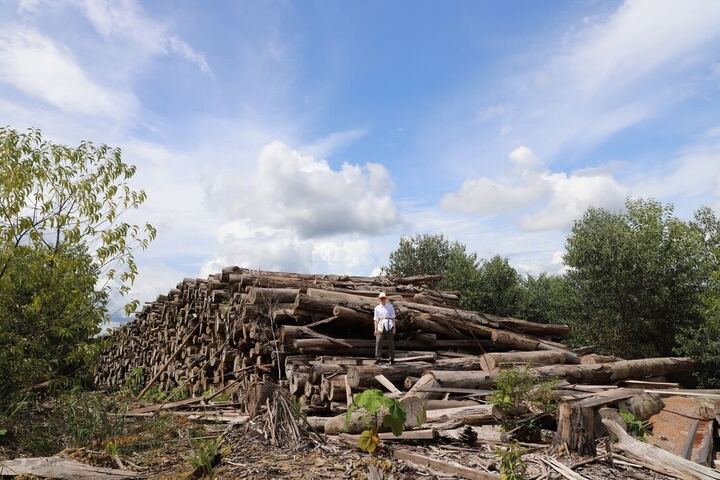
Fixing the Leak: How Methane Reduction Could Rescue Ahold Delhaize’s Climate Goals
By Jurjen de Waal, Senior Director of Netherlands, Mighty Earth
As one of the world’s biggest food retailers and the parent company of Stop & Shop, Food Lion, Giant, Albert Heijn, and Delhaize, Ahold Delhaize claims to be a climate leader. It has pledged to reach net zero by 2050 and cut Scope 3 (or supply chain) emissions by 37% by 2030. On paper, these commitments are good progress.
But here’s the problem: the math doesn’t add up, and the company is missing a critical piece of the climate puzzle: methane emissions from its meat and dairy supply chain.
The only way Ahold Delhaize can truly become a climate leader and get back on track to meet its climate targets is by adopting an ambitious methane reduction strategy—one that includes expanding its plant-based product goals to its U.S. brands. Read on to find out why this shift is not only necessary but also inevitable.
Methane: the best way to halt global warming
Methane is a superheater more than 80 times more potent than CO₂ over 20 years. Scientists agree cutting methane is the most effective way to slow global warming. Cows are the new coal so to speak, as livestock is the biggest man-made source of methane, making meat and dairy sold in Ahold Delhaize’s stores a massive contributor to its share of emissions.
Yet the company:
Does not report its methane emissions
Has no specific methane reduction targets
This is out of step with what science tells us is needed. According to the UN Environment Programme, methane emissions must fall by 40-45% by 2030 to keep global warming below 1.5°C. Over 150 countries have joined the Global Methane Pledge, committing to a 30% cut by 2030 based on a 2020 baseline.
A Methane Footprint Bigger Than Entire Countries
Since Ahold Delhaize does not report their methane emissions, Mighty Earth commissioned independent research group Profundo to estimate them. The result? Ahold Delhaize’s methane footprint from meat and dairy alone is larger than the total methane emissions of countries like Sweden or Denmark.
Nearly half of these emissions come from its U.S. operations, yet its American brands have been left out of the company’s plant-based targets, one of the most effective ways to drive down methane emissions. Without action in this key market, Ahold Delhaize’s overall climate strategy is at risk.
Asked at the AGM—No Clear Answer
At the company’s Annual General Meeting, Mighty Earth’s Jurjen de Waal asked CEO Frans Muller whether Ahold Delhaize would commit to disclosing its methane emissions and setting a clear methane reduction target. While Muller acknowledged the issue, no commitment was made.
Instead, he pointed to the company’s pending targets with the Science Based Targets Initiative (SBTi). But this answer raises more questions that it resolves.
SBTi Targets – But emissions are going UP
Ahold Delhaize’s original scope 3 targets were submitted to SBTi in 2022 but had to be resubmitted in 2023 after SBTi added new requirements to distinguish between Forest, Land and Agriculture (FLAG) and non-FLAG emissions.
The company’s revised targets now include a 30.3% reduction in FLAG emissions by 2030. Reductions in methane emissions from meat and dairy would help achieve this target. However, according to its own 2024 Annual Report, Ahold Delhaize’s FLAG emissions have not gone down, but up by 9.9%!
That’s not just off-track – it’s heading completely in the wrong direction.
At the same time, Ahold Delhaize continues to push its “Growing Together” strategy with no clear explanation for how increased sales and market expansion will align with its emissions reduction goals.
There’s a better way: A Methane Strategy
The good news? Ahold Delhaize still has an opportunity to turn this around, by developing a dedicated methane reduction strategy. This would align the company’s targets with the scientific consensus that reducing methane emissions is the best way to halt global warming and help drive down FLAG emissions in line with their SBTi targets and support validation of its plans.
An effective methane strategy to close the gap between and ambition and action means that Ahold Delhaize needs to:
Disclose methane emissions from meat and dairy
Set a clear methane reduction target of at least 30% by 2030
Include U.S. operations in climate targets and plant-based ambitions
This can make its Net Zero promise and FLAG targets be considered credible again – and deliver real-world impact.
Time to show leadership and take the bull by the horns
Until that happens, Ahold Delhaize’s climate promises risk remaining just that: promises. But with a comprehensive methane strategy, the company has a powerful opportunity to lead.
Read Mighty Earth’s full briefing, “Taking the Bull by the Horns,” to see what real leadership on methane could look like.


